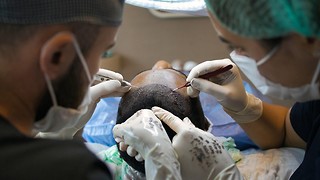Can coronavirus help us reconnect with our physical health?
The second in her column on ‘connections’, Ella Gold wonders whether we might learn to take better care of our bodies after coronavirus

As a student at university, the threat of illness looms ever-present in each nook and cranny of the city. It is practically impossible to go a single day without speaking to someone who’s lost their voice, seeing a bedroom floor with empty Strepsil packets scattered like fallen soldiers, or noticing the distinctive aroma of a lemon and ginger tea drifting down the corridor. Even BC (before corona), paracetamol always seemed to me the most frequently out of stock item in Sainsbury’s - aside from pesto, of course, but that’s pretty much a medicine in its own right. I spend a lot of time in theatre audition rooms in Cambridge, and genuinely cannot recall a single day of auditions in which there hasn’t been at least one person warning us of their illness. When it’s midway through second year and the same bugs seem to be going round your college, freshers flu starts to feel like a kind of forever flu.
Berocca (a vitamin C supplement) is an absolute staple of my uni diet, up there with pasta and wine, and yet in my year and a half at Cambridge, I’ve been ill more times than I can count. My overworked immune system has, among other things, led to me being bed-ridden for most of freshers’ week, having to drop out of a play on closing night, and ending first year with the joy of paying that mandatory visit to the all-too-familiar Addenbrooke’s.
Perpetual poor health among students is not only commonplace but has come to be seen as entirely expected. For some, complaining of illness is even a sort of boast, up there with ‘oh yeah, I haven’t done work in forever, I’m so behind.’ At Cambridge, we are so used to those kinds of backwards-logic remarks which are meant to leave others in awe of your nonchalance for both your degree and your health, but also do nothing for your self-esteem.
"We’ve all been forced to turn the spotlight onto our own wellbeing, in a way which feels frankly alien."
In our student lives, driving ourselves into the ground with work, renouncing proper food and sleep, and eight-week long coughs are all normalised. Terms move at a mind-boggling pace, so it’s unsurprising that we repeatedly overwork our minds at the expense of a healthy body.
But when you actually stop to think about it, our neglect for our physical health during term time is a pretty scary mentality to be stuck in. While mental health is equally important - and, if anything, even more neglected - our attitude towards our physical health is frankly bizarre. Hearing a friend remark that, ‘I’ve got crippling depression but I’ve got to get this essay done’ would - quite rightly - elicit concern and hopefully some kind of action, whereas ‘I’ve had a terrible fever all week and can’t get out of bed’ is likely to receive a laugh or an exclamation of solidarity. I’m in no way trying to compare these things, but simply suggesting that poor physical health has become a worryingly universal expectation of student life.
Now, it feels almost laughable to talk about the health benefits of a pandemic, and I should make a disclaimer that I am entirely aware that this is coming from a place of immense privilege. But in terms of our attitudes towards our physical health as students, I really believe lockdown has the potential to bring about some positive change.
Whereas before our health was so easy to dismiss, put off as a concern for another time, suddenly that dynamic has changed. Now that getting ill comes with the risk of infecting others with what could be a seriously dangerous and potentially life-threatening disease, neglecting the importance of your physical health is no longer a personal decision. We’ve all been forced to turn the spotlight onto our own wellbeing, in a way which feels frankly alien. Our health now feels like it matters so much more than it ever did before. What’s more, spending endless hours sitting at home promotes a heightened awareness of our own physical existences, and encourages a renewed level of care for our bodies.
Whether this translates into long-procrastinated exercise, sleeping more, or simply watching more ‘Grey’s Anatomy’, this shift in our connection between mind and body, this sudden prioritisation of self-care, is surely a positive thing. One can only hope that it’s something we try to mindfully carry through into next term and beyond. I, for one, am sure that the Boots’ tissue aisle has seen quite enough of me for one degree. And I'm only halfway through.
 Features / Meet the Cambridge students whose names live up to their degree9 September 2025
Features / Meet the Cambridge students whose names live up to their degree9 September 2025 News / Student group condemns Biomedical Campus for ‘endorsing pseudoscience’10 September 2025
News / Student group condemns Biomedical Campus for ‘endorsing pseudoscience’10 September 2025 News / Tompkins Table 2025: Trinity widens gap on Christ’s19 August 2025
News / Tompkins Table 2025: Trinity widens gap on Christ’s19 August 2025 News / New left-wing student society claims Corbyn support11 September 2025
News / New left-wing student society claims Corbyn support11 September 2025 Science / Who gets to stay cool in Cambridge?7 September 2025
Science / Who gets to stay cool in Cambridge?7 September 2025









